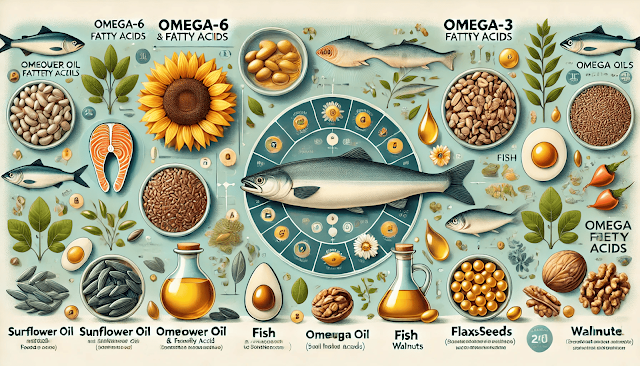Seed Oils significance in our life
Seed Oils: Myths and Realities Uncovered
Critics of seed oils have come out in force in the last few years, and I mean generally, citing their supposed health dangers, whilst advocates say they are good and don't cause any harm at all. Sunflower, rapeseed (canola), corn and grapeseed oils are staple ingredients in kitchens and processed foods around the world. But now the big question;Are seed oils good or bad for you? This extensive article covers everything you need to know, from the production processes to the health effects, controversies, and expertise regarding seed oils.
The Case Against Seed Oils;What Are They?
Seed oils are expressly not the fruit-based oils,such as olive or avocado oil, but rather oils extracted from the seeds of plants. The following are examples of common seed oils:
- Sunflower oil
- Canola oil
- Corn oil
- Soybean oil
- Grapeseed oil
Seed oils became popular because they were cheap, available and had high smoking points that made them better suited for frying and other high temperature cooking methods. They’re also marketed as heart-healthy substitutes for animal lipids such as butter and lard.
How Are Seed Oils Made? Dooming the extraction and refinement process
Seed oils are produced through a few steps like extraction and refining the oil. Here’s a closer look:
- Extraction
- Mechanical pressing: In this method, hydraulic or screw presses are used to extract oil from seeds.
- Solvent extraction: More efficient extraction of oil is performed by using chemical solvents, e.g. hexane.
- Refining
- This cleans it up of impurities, odours and unwanted compounds to create a stable, neutral-flavoured oil.
- Refining also strips beneficial compounds, such as antioxidants and polyphenols.
- High-Heat Processing
- Use of oil at high temperature can produce dangerous chemical residues, precursors of trans fats, when reused, overheated or evaporating during frying.
Although the actual refining process makes seed oils much more shelf stable and easier to use, it also alters their nutritional profile, stripping a lot of health-promoting properties.
Nutritional Composition of dietary Seed Oils
Seed oils are primarily made up of polyunsaturated fats (PUFAs); specifically omega-6 fatty acids. They also include negligible amounts of monounsaturated fats and saturated fats. Here’s what makes up their key type:
- Omega-6 fatty acids: These are essential for the body to function, including cell growth and brain development.
- Vitamin E: A natural antioxidant that fights oxidative stress.
- Trace minerals: Small amounts, varying by seed type.
While these oils do have several benefits, the omega-6 content in seed oils has sparked debate.
Health Benefits of Seed Oils
1.Cardiovascular Health
Substituting polyunsaturated fats (like those in seed oils) for saturated fats has been shown to reduce LDL (“bad”) cholesterol.
Research has shown that the use of seed oils can lower the risk of heart disease.
2.Rich Source of Vitamin E
Vitamin E, which protects cells against oxidative damage and supports the immune system.
3.Improved Blood Lipid Profiles
Regular incorporation of seed or “vegetable” oils into your diet may balance cholesterol, reducing LDL while increasing HDL (“good”) cholesterol.
4.Calorie Efficiency
Seed oils are calorie-rich meaning that when consumed in moderation they are a rapid energy source.
Substituting polyunsaturated fats (like those in seed oils) for saturated fats has been shown to reduce LDL (“bad”) cholesterol.
Research has shown that the use of seed oils can lower the risk of heart disease.
2.Rich Source of Vitamin E
Vitamin E, which protects cells against oxidative damage and supports the immune system.
3.Improved Blood Lipid Profiles
Regular incorporation of seed or “vegetable” oils into your diet may balance cholesterol, reducing LDL while increasing HDL (“good”) cholesterol.
4.Calorie Efficiency
Seed oils are calorie-rich meaning that when consumed in moderation they are a rapid energy source.
And the Controversy: Are Seed Oils Bad for You?
Despite the many benefits seed oils provide, many critics warn that their omega-6 content can have potential health risks, particularly if you consume large quantities. Here are the major concerns:
1.The Link of Omega-6 Fatty Acids to Inflammation
Omega-6 fatty acids are building blocks of inflammation-promoting compounds.
But research has found no clear evidence that eating omega-6 directly raises inflammation or chronic disease risk.
2.Effect on Omega-6 to Omega-3 Ratio
Consuming an excessive amount of omega-6 fatty acids, along with low omega-3 fatty acids, can throw off the proper ratios of both of these fatty acids.
Western diets have an omega-6 to omega-3 ratio of 15:1 or higher, compared to the optimal ratio of 4:1.
3.Formation of Trans Fats
Repeated heating or over-processing of seed oils can lead to produce (trans fats) is harmful for heart health.
A Double-Edged Sword: Seed Oils in Processed Foods
Seed oils are everywhere in processed and fast food;crisps, biscuits, fried stuff. Although the oils themselves are not inherently dangerous, the foods that come with them usually are full of added sugars, salt and unhealthy fats. Overconsumption of those products leads to obesity, diabetes, and cardiovascular diseases.
Adjusting Omega-6 to Omega-3 Fatty Acid ratio
- To keep a good ratio of omega-6 to omega-3 fatty acids, consider making these dietary changes:
- Amp up omega-3-rich foods,think salmon, chia seeds and walnuts.
- Reduce intake of processed foods that contain high levels of seed oils.
- Use other oils rich in omega-3s, such as olive oil or flaxseed oil.
Expert Opinions on Seed Oils
Most health professionals say that seed oils can be consumed as part of a healthy diet. For instance:
- According to Dr. Christopher Gardner (Stanford University), omega-6 fatty acids can be precursors to inflammatory molecules, but their effects in the human body do not appear to be harmful inflammatory increases.
- The American Heart Association has thus recommended that we replace saturated fats with unsaturated fats, think seed oils, to improve heart health.
The Role of Moderation
Seed oils are neither “good” nor “bad,” but are determined by how they are employed. Here are some tips for both their safe consumption and use:
- Use a lot of omega-6, can take it easily, do not take too much.
- Do not overheat the oils such that you produce toxic byproducts.
- Your diet should be based on whole foods, not heavily processed ones.
Explaining Seed Oils: A cheap and flexible source of dietary fat: pros and cons Their safe consumption balances on moderation. They have these claims against them which are true, but scientific evidence does not completely show them causing harm when part of a balanced diet.
To achieve optimal health, minimise processed and refined foods in the diet and attempt to balance omega-6 with omega-3 fatty acids. Stay right there, and make seed oils a valuable part of your cuisine and diet.
Stay healthy and stay safe,
Have a nice day 😊.








Comments
Post a Comment